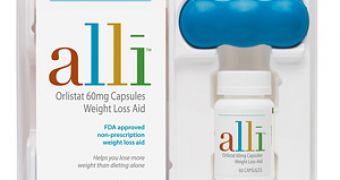A week ago, orlistat, the much-mediated anti-obesity drug, went on sale over the counter in the UK as Alli, the so-called wonder diet pill from Glaxo. Dubbed as being able to help dieters lose about 50 percent more weight than they would by dieting alone, the pill seems a more convenient alternative to other slimming solutions, including restrictive traditional diets. Yet, specialists warn that not everything about Alli is moonlight and roses, which is why slimmers should pay attention to details and consider their choice thoroughly before going to the pharmacy to purchase it.
Leaving aside the fact that, as opposed to traditional diets, Alli costs more (about £300 for six months, which is the minimum to achieve a weight loss of approximately 5kg), there are also serious health considerations that have to be taken into account before starting one such treatment. As it is already a known fact, Alli acts on the body in such a way as to prevent the absorption of fat, with about 25 percent of the fat ingested being eliminated.
However, Alli does not distinguish between good fat and bad fat, being, in this sense, old-fashioned for targeting all fat as bad, specialists say for the Daily Mail. One consequence of not absorbing fat is, in the short term, the nastiest side-effect of Alli, known as fecal inconsistency or stool urgency, accompanied by oily spotting. Another consequence, this time in the long run, is that, with fat absorption going down, so will the intake of vitamins, especially A, D and E, which are carried in fat. Because of this, Glaxo recommends taking a multivitamin pill daily and keeping to a low-fat diet to counteract as much as possible all these side-effects.
The question of whether Alli is as effective as it’s being marketed is also a very controversial one, the Mail says. For starters, older research has shown that a dieter could hypothetically achieve the same results as with the pill by simply cutting down the calorie intake by 100 calories. Add to that some regular exercise as well, and the outcome should by far surpass the one with Alli, it is being said.
Secondly, the weight-loss with the pill is not that significant. The active ingredient in it – Xenical – can be acquired with a prescription from the GP, and is about 30 percent more efficient than Alli, wherefrom the skeptics’ conclusion that Alli is just a marketing strategy meant to eliminate GPs from the equation for fear they might raise concerns, by allowing the pharmacist to decide whether one person or another should take it.
Understandably, Glaxo is denying all these claims, saying that the efficiency of Alli has been proven beyond any doubt. “Alli’s safety and effectiveness has been proved in trials of more than 30,000 patients. The FDA [in the US] has rejected the claim of a cancer link and so has the European regulatory agency. Alli is made available over the counter because the vast majority of people don’t consider going to their doctor for weight loss and Alli gives them an effective alternative.” a spokesperson for the manufacturer tells the Mail.
The bottom line to this is that all would-be dieters should make sure to see the bigger picture, specialists say. Staying informed about all the choices we make – including the one regarding Alli – is the only way we can ensure we aren’t lured into buying something that is neither as healthy, nor as useful as we might have been initially made to believe.

 14 DAY TRIAL //
14 DAY TRIAL //